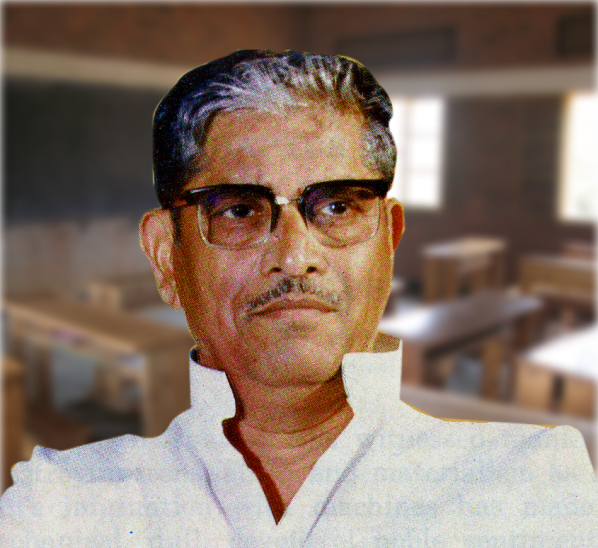- Having founded a school combining India’s sacred knowledge with Western learning, he began meeting regularly with a group of earnest young truth seekers, entrepreneurs, doctors, engineers, lawyers.
- ATHAVALE’s middle-class disciples ventured into rural villages to propagate swadhyaya and to advance their teacher’s belief that barriers of caste, gender, and religion must be transcended in order to recognize the true equality of all people.
- ATHAVALE or Dada (elder brother), as he is popularly known, guides a huge spiritual movement that courses through thousands of villages and touches millions of urban and rural Indians.
- The RMAF board of trustees recognizes his tapping the ancient wellsprings of Hindu civilization to inspire spiritual renewal and social transformation in modern India.
In the Vedas and other sacred texts, India’s ancient sages conveyed a view of the cosmos so complex and compelling that it survives vibrantly today. Enriched but never overtaken by newer religions over the centuries and by its encounters with the clamoring “isms†of our own time, Hindu civilization pervades the life of modern India. From deep within it, PANDURANG SHASTRI ATHAVALE is drawing strength for his country’s spiritual renewal and material uplift.
Born to a family of Brahmin religious scholars in Maharashtra, ATHAVALE mastered Sanskrit as a youth and absorbed the wisdom of the Hindu classics. In Japan to attend a world religions conference in 1954, he asserted confidently the salience of Vedic teachings and way of life. Someone asked: In your country, is there a single community that lives by these ideals? Disturbed by this question, ATHAVALE returned home and pondered frankly the grim realities of contemporary Indian life.
Having founded a school combining India’s sacred knowledge with Western learning, he began meeting regularly with a group of earnest young truth seekers—entrepreneurs, doctors, engineers, lawyers. He led them to cultivate self-awareness (swadhyaya) and to devote a portion of their free time to acts of devotion and gratitude to God. Taking up the call in 1958, ATHAVALE’s middle-class disciples ventured into rural villages to propagate swadhyaya and to advance their teacher’s belief that barriers of caste, gender, and religion must be transcended in order to recognize the true equality of all people.
In the ensuing decades, ATHAVALE’s volunteers swelled to hundreds, then thousands, then tens of thousands. Today, ATHAVALE or Dada (elder brother), as he is popularly known, guides a huge spiritual movement that courses through thousands of villages and touches millions of urban and rural Indians. Although emphatically spiritual, the swadhyaya movement has brought striking social and material benefits to its adherents.
In hundreds of villages, swadhyaya devotees have abandoned drunkenness, gambling, wife-beating, and petty crime to devote themselves to community betterment. Fisherfolk, chanting Sanskrit hymns, ply “boat temples†whose daily catch is reserved for the local hungry. Villagers plant multi-hectare “tree temples†to restore degraded land and to make their habitats green again. Farmers cultivate the common fields of “God’s farm†to grow food to share with needy neighbors. Swadhyaya-imbued villages are clean, tidy, and prosperous. Children faithfully attend school. Villagers of all castes, men and women, worship side by side. Untouchability is not recognized. Moreover, communal strife is rare in swadhyaya communities and, in some places, Muslims, Hindus, and Christians share the same place of worship.
Even so, ATHAVALE often reminds people that swadhyaya has nothing to do with politics and is not undertaken to solve the problems of the world. “We are merely planting a bouquet of flowers,†he says, “of love, compassion, selflessness, and peace.â€
A small organization of volunteers gives some coordination to ATHAVALE’s vast “family†and guides the work of swadhyaya schools. But it is largely through teaching that ATHAVALE leads the movement. His pithy, conversational sermons hold multitudes in rapt attention and circulate widely in print and on cassette.
In them, ATHAVALE teaches that “God resides in everyone†and that achieving “spiritual oneness†will bring with it solutions for worldly problems. Calling upon the oldest of Hindu teachings, but alluding to Western thinkers as well, seventy-five-year-old ATHAVALE exhorts his listeners to liberate themselves from preconceived ideas and “baseless beliefs.†“The basic revolution,†he asserts, “should be of the human mind.â€
In electing PANDURANG SHASTRI ATHAVALE to receive the 1996 Ramon Magsaysay Award for Community Leadership, the board of trustees recognizes his tapping the ancient wellsprings of Hindu civilization to inspire spiritual renewal and social transformation in modern India.
I accept most gratefully the Ramon Magsaysay Award for Community Leadership. I am honored because this award carried the name and the spirit of a truly great Asian of the twentieth century. The late Ramon Magsaysay was a step ahead of others and he lived for his ideas. He tried to cultivate a sense of self-respect and self-esteem in the people of his republic.
I too have been trying to live and work for similar objectives. However, my philosophy is based on the principles of the indwelling God and devotion to Him. Human beings can feel close to each other if we accept the idea of “the indwelling God generating and operating everyone’s body.†Consciousness of the nearness of God helps in developing self-respect in individuals and overcoming human pains and problems. I consider devotion to God a “social force.†The expression of gratitude to God by way of offering one’s time and efficiency can result in collective activities, which in turn create community resources and their just distribution for the common good. However, we, Swadhyayees, undertake these activities to reorient individual perspective towards life and collective existence that builds self-esteem and confidence. Without this, one can neither achieve individual development nor ensure a healthy community life.
In conferring the award on me, you have appreciated the importance and relevance of my philosophy in the modern times and the selfless work carried on by Swadhyayees the world over.
Once again, I express my gratefulness to the Ramon Magsaysay Award Foundation, personally and on behalf of the millions Swadhyayees around the world.

